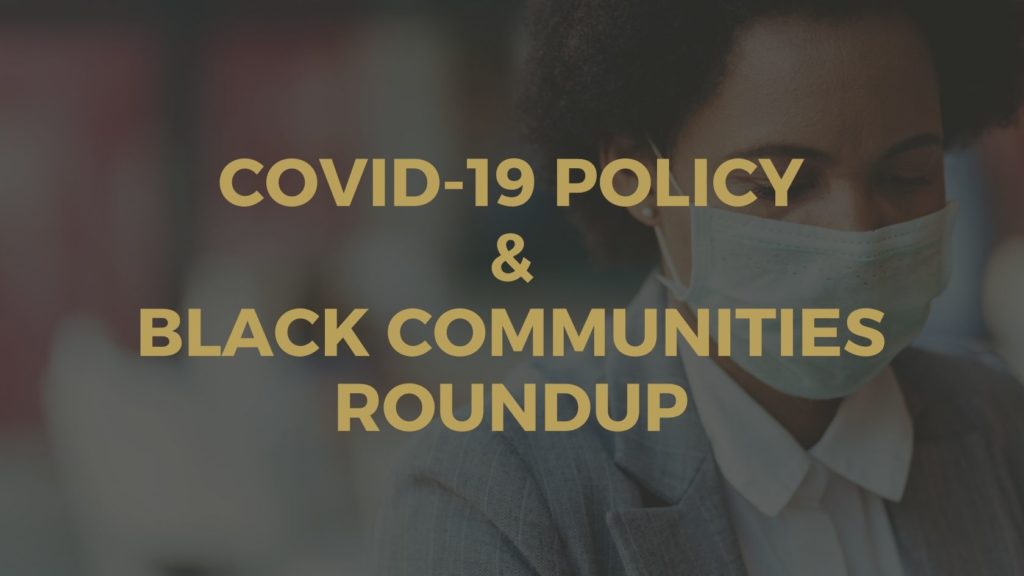
September 1 COVID-19 Policy & Black Communities Roundup
Speaker Pelosi Rejects White House Stimulus Offer as Insufficient
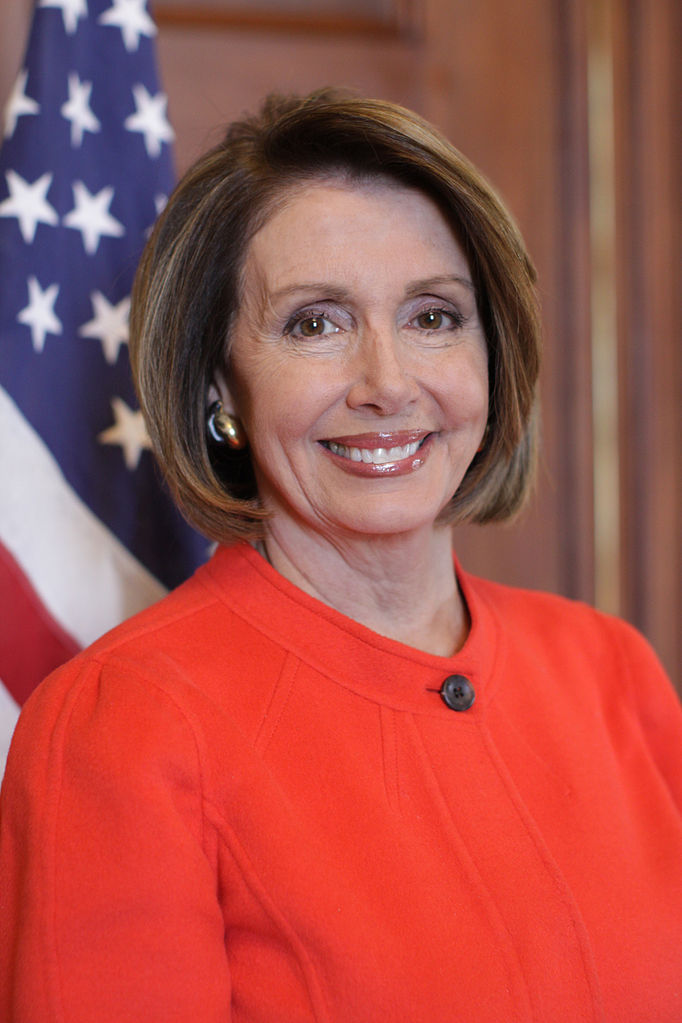
Last week, efforts to reach agreement on a new round of coronavirus relief measures stymied, as House Speaker Nancy Pelosi (D-CA) rejected a $1.3 trillion bill offered by the White House. After a conversation with White House Chief of Staff Mark Meadows, Speaker Pelosi explained that nothing less than the $2.2 trillion in relief is acceptable. The White House offer falls far short of the original $3 trillion HEROES Act passed by House Democrats in May, and is only slightly larger than the $1.1 trillion package proposed by Senate Republicans, who remain on a scheduled summer recess as more than 20 percent of Black and Latino households face food insecurity. Additional relief could be delayed until the end of September.
With the White House’s response to the coronavirus crisis looming as the top issue in the upcoming November elections, several GOP House seats are on the line in Texas, one of the states hit hardest by the pandemic. Meanwhile, the Justice Department is pressing the Democratic governors of New York, New Jersey, Michigan, and Pennsylvania for information on the pandemic’s impact on nursing homes on the premise that coronavirus protocols implemented by the governors caused the deaths of elderly residents. Previous analysis demonstrates that coronavirus infections at nursing homes with a significant number of Black and Latina/o residents are double that of those with predominantly white residents.
CBC Calls on Senate to Vote on Police Reform
“My brother cannot be a voice today… we have to be that voice, we have to be the change”
George Floyd’s sister Bridget addresses crowds attending the Commitment March in Washington https://t.co/MJDENjCrkj pic.twitter.com/YsVDg6HVwY
— BBC News (World) (@BBCWorld) August 28, 2020
Last week—against the backdrop of the Republican National Convention, National Action Network’s Commitment March, and Movement for Black Lives’ Black National Convention, police shootings of Jacob Blake in Kenosha, WI and of Trayford Pellerin in Lafayette, LA, pushed calls for police reform and social justice back to the top of the national agenda.
In the wake of the aforementioned police shootings of two Black men, the Congressional Black Caucus—led by Congresswoman Karen Bass (D-CA)—pressed Senate Majority Leader Mitch McConnell (R-KY) to hold an immediate vote on the George Floyd Justice in Policing Act.
Proposed House Appropriations Panel on Equity
Citing increased demands for equity, justice, and diversity, Congresswoman Debbie Wasserman Schultz (D-FL) proposed that the House Appropriations Committee establish an Advisory Panel on Equity and Justice to review and identify inequities in federal spending in marginalized communities, including those of people of color. The proposed panel would review federal programs such as the HBCU Capital Financing program, and apply spending methodologies including Majority Whip James Clyburn’s (D-SC) 10-20-30 anti-poverty formula, aimed at mitigating inequities.
For more on Congress and the COVID-19 stimulus this week, see the National Urban League’s Washington Bureau Insider.
Economic Studies & COVID-19
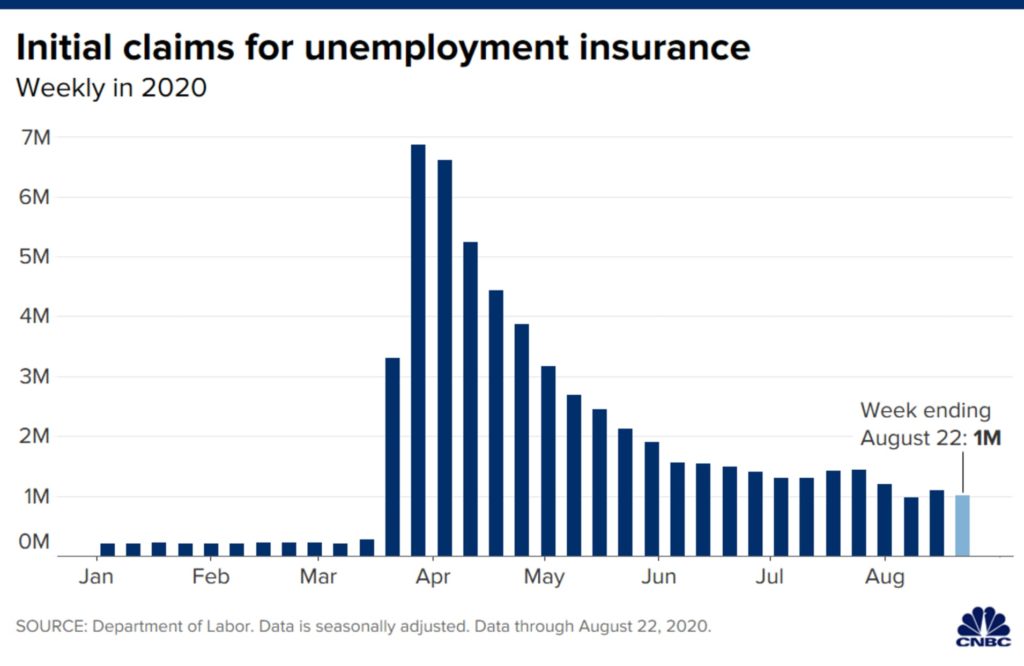
Another one million Americans filed initial weekly unemployment claims for the week ending August 22. While this is a 98,000 claim decrease from the week prior, claims remain significantly higher than the pre-coronavirus pandemic single-week record high of 695,000 claims set in 1982. Since the pandemic began, initial filings have been over one million for 22 out of 23 weeks.
Six states (AZ, LA, MO, MT, TN & TX) have started to implement the Lost Wages Assistance (LWA) program signed into effect by President Trump to provide a federal $300 weekly unemployment supplement (in place of the original $600 supplement). To qualify, filers must have lost their job due to COVID-19 related reasons, and make at least $100 from state unemployment, neither of which were required to receive the $600 supplement. The program, which is run by the Federal Emergency Management Agency, also allows states to provide their own $100 supplement.
The $600 weekly supplement to jobless benefits expired July 31, and the Economic Policy Institute asserts that “dropping the $600 is also exacerbating racial inequality.” 28.8 million workers are currently unemployed and Black workers had higher unemployment rates than workers of any other race in July.
Brookings Institution scholars Stephen Roll and Michal Grinstein-Weiss find that compared to white households, “Black households were 8 percentage points more likely to experience a delay, and Hispanic households were 11 percentage points more likely to experience a delay” in receiving coronavirus stimulus payments granted through the CARES Act.
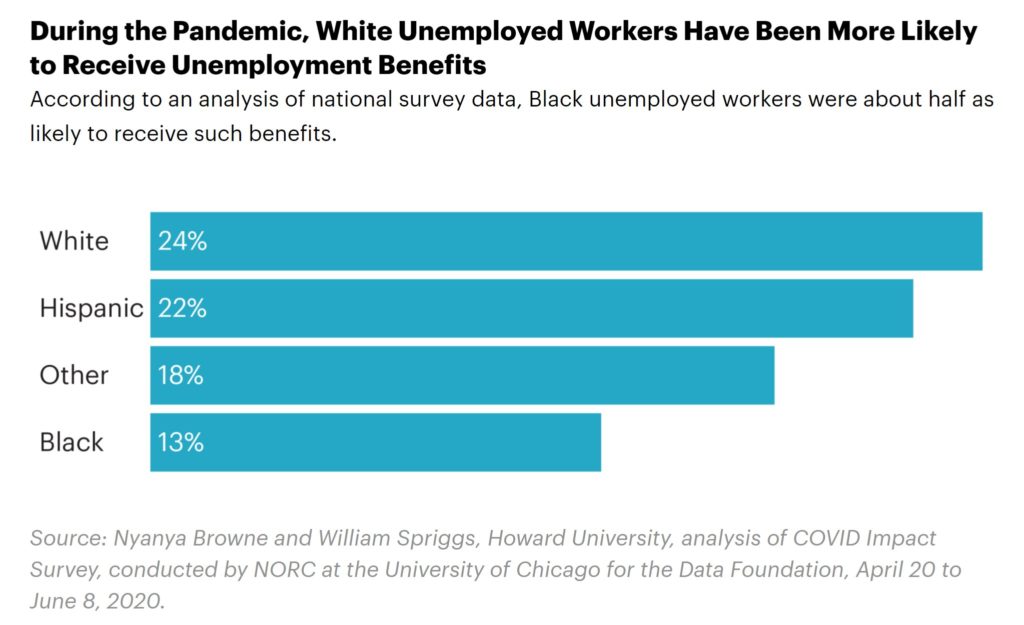
Although Black workers are more likely to be unemployed than white workers, ProPublica highlights that they are less likely to receive jobless benefits according to an analysis of COVID Impact Survey results by Nyanya Browne and William Spriggs of Howard University.
Housing experts predict that 40 million households will be evicted by years end with Black and Latina/o renters most at risk. Citing the US Census Bureau, The Washington Post reports that “in July, 44 percent (of Black renters) and 41 percent (of Latina/o renters) said they had no or slight confidence they could make the next month’s payment or were likely to defer it.”
A recent report shows that as of August 10, the number of rent payments received by landlords dropped by 29% since March. The Joint Center’s report, Pandemic Relief Priorities for Black Communities, calls for federal policymakers to prioritize rental assistance for Black communities. To assist local leaders, the Urban Institute developed the Emergency Rental Assistance Priority Index, which “emphasizes an equitable approach, accounting for risk factors that are higher for certain groups, particularly Black, Indigenous, and Latina/o renters.”
More than 100 Black child care workers in North Carolina expressed concerns over low wages, lack of benefits, and coronavirus safety risk at a virtual town hall organized by the National Domestic Workers Alliance, MomsRising, and the North Carolina Justice Center.
The Oregon Cares Fund for Black Relief and Resiliency is accepting grant applications from Black Oregon residents who have been financially harmed by the COVID-19 pandemic.
Political Studies & COVID-19

COVID-19 vaccine trials continue to lack sufficient numbers of Black, Latina/o, and Native American participants to reflect the racial and ethnic diversity of the U.S. according to the Washington Post. Debates continue regarding whether trials should go beyond mirroring the U.S. racial and ethnic demographic breakdown to mirror the disproportionate impact of COVID-19 on people of color.
NPR reports that “even during the COVID-19 pandemic, mortality rates and life expectancy are far better for white Americans than they are for Black people during normal, non-pandemic years.” The story is based on a study in the Proceedings of the National Academy of Sciences entitled “U.S. Racial Inequality May Be as Deadly as COVID-19.” With polls showing that one in three Black Americans know someone who has died of COVID-19, Vox shared experiences of Black people who have lost loved ones to coronavirus.
African Americans and Latinas/os are likely to experience post-coronavirus health implications that may go underdiagnosed, explains Lamar University Professor and Social Epidemiologist Dr. Gage Witvliet.
Calmatters reports that “Black students face compounded anxiety over the killing of George Floyd and violent police responses to ensuing protests.” They point out that remote learning and sheltering in place add to existing mental health challenges for college students.The American College Health Association (ACHA) recommends that reopening colleges have culturally relevant health messaging and staff training on implicit bias issues. ACHA also recommends that schools provide branded face masks to reduce racial profiling incidents by law enforcement toward Black males.
Demos issues a report outlining “a Right-to-Vote Amendment for a 21st Century Democracy” that would remedy many voting obstructions faced by Black and Brown communities including universal voter registration and abolishing the Electoral College.
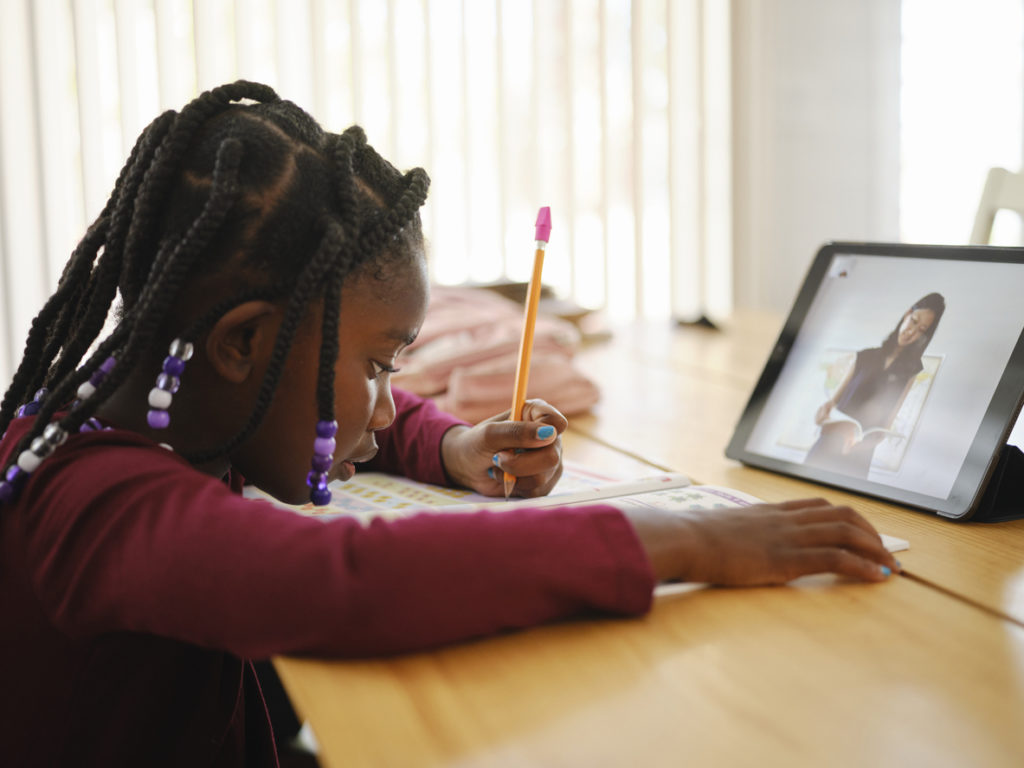
Branch Alliance for Educator Diversity Founder, President, and CEO Dr. Cassandra Herring insists that the pandemic response in the education system should prioritize diversifying the teacher workforce. Teachers of color account for 20% of all public school teachers and more than 40% of public schools don’t have a teacher of color.
Nearly six months into the pandemic, “an estimated 35% of Black households and 29% of Hispanic households are still without a broadband connection” according to Governing’sJabari Simama. In our report Pandemic Relief Priorities for Black Communities, the Joint Center called on policymakers to address this crisis by providing a $50 a month emergency broadband supplement for vulnerable households.
Movement Building
Color of Change issues a petition to the D.C. Bar Association against lawyer Jack Burkman for targeting voters with disinformation about vote-by-mail.
Harvard Library curates a collection that includes documents outlining the experience of COVID-19 across Black communities in America, and designs a month-long virtual journaling retreat on their BlackCovidTales Instagram page called From Pandemic to Healing.
Joint Center partner, The Leadership Conference on Civil and Human Rights President Vanita Gupta testifies before the U.S. House of Representatives Committee on House Administration about safe, fair, and accessible voting during COVID-19.
The NAACP Legal Defense and Educational Fund, Inc. launches a new voting rights website that includes information on the upcoming election and as well as on voting in ten states with laws that make it harder for Black people to vote.
The National Action Network and several other civil rights organizations hosted the 2020 Commitment March on the 57th anniversary of the March on Washington where Dr. Martin Luther King Jr’s gave his “I Have a Dream” speech. The Joint Center was a partner organization and co-sponsor.
The 2020 March on Washington Film Festival will take place virtually on September 20-27, and features a re-enactment of the James Baldwin / William Buckley debate, a gala honoring Congressman John Lewis, and films on Black newspapers, Black filmmaker Oscar Micheaux, and civil rights strategist Bayard Rustin.
Events
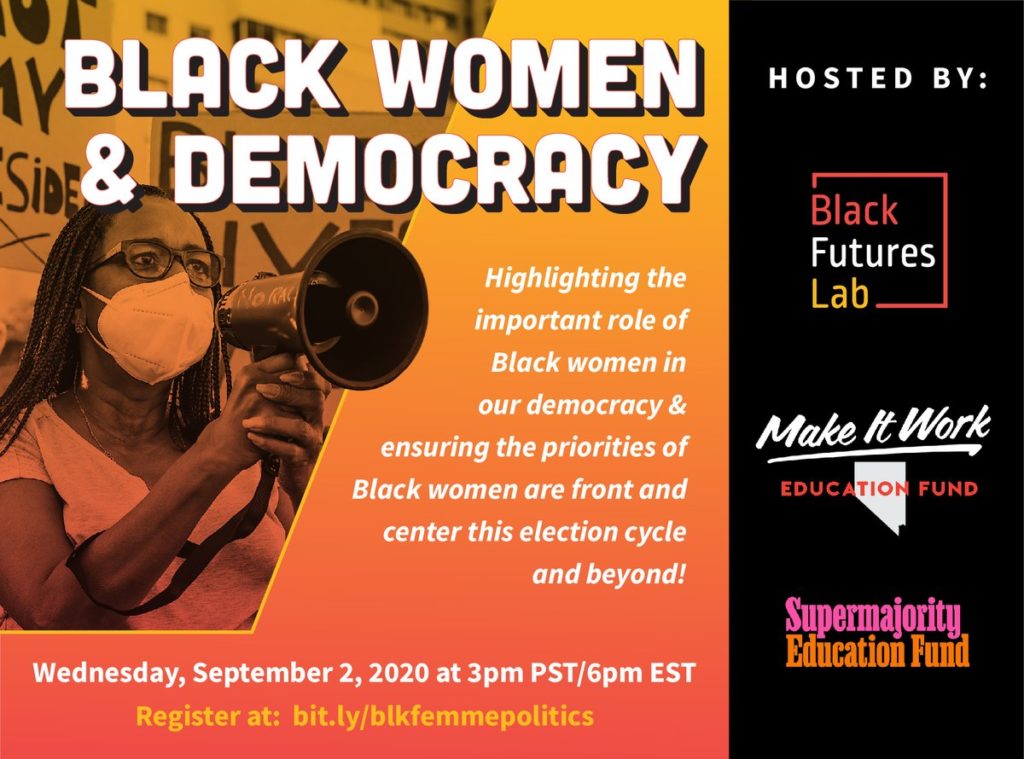
Upcoming events include: “Coast to Coast: Resiliency and innovation during COVID-19” (Knight Foundation, September 1); “Black Women and Democracy” (Black Futures Lab, September 2); “DISCOVERY: Centering the arts in your city’s present and future” (Knight Foundation, September 4); “Economic Forecasting Uncertainty on the U.S. Economies” (REMI, September 9); “Business Responses to Homelessness & COVID-19: The Good, Bad, and Ugly” (National Homelessness Law Center, September 9); “Call and Response: Harvard’s Response to Black American Experiences during COVID-19” (Harvard Library, September 11).
Last week, events were held by the Brookings Institution, Center for Law and Social Policy (CLASP), Color of Change, Impact Media, Knight Foundation, National Homelessness Law Center, New America, Poor People’s Campaign, and The Leadership Conference on Civil and Human Rights.
The Joint Center thanks the Annie E. Casey Foundation, the Boulé Foundation, the Democracy Fund, Toyota Motor North America, Inc., UPS, and the Walmart Foundation for additional support that has allowed us to do some of our COVID-19 and Black Communities work.

